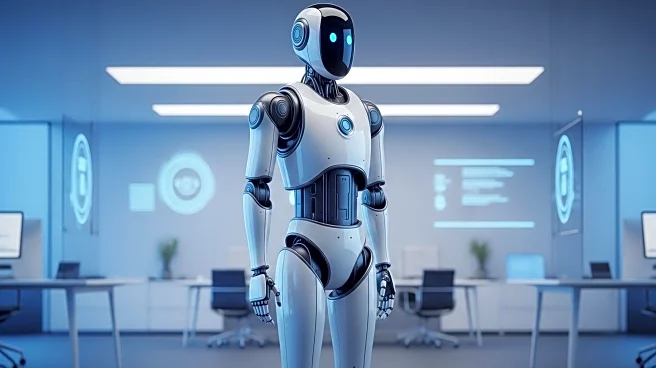What is the story about?
What's Happening?
A growing trend among CEOs is to pause hiring entry-level workers, favoring AI technologies instead. This shift is particularly affecting Gen Z graduates who are entering the job market. Bill Hoogterp, a career coach to Fortune 500 executives, confirms that many companies are reconsidering the value of new hires due to economic uncertainties and technological advancements. The scrutiny on new hires is increasing, with companies seeking individuals who can solve specific problems rather than creating jobs for the sake of it. This situation is exacerbated by the fact that AI can perform tasks such as coding, copywriting, and data analysis more efficiently than humans, leading to a reduction in traditional entry-level positions.
Why It's Important?
The shift towards AI over entry-level workers has significant implications for the job market, particularly for Gen Z. As AI technologies become more prevalent, the demand for traditional entry-level roles diminishes, potentially leading to higher unemployment rates among recent graduates. This trend could reshape the workforce, requiring new graduates to adapt by acquiring skills that complement AI technologies. The emphasis on problem-solving and value creation means that Gen Z must identify areas where their skills intersect with market needs. This shift could also lead to a reevaluation of educational priorities, as institutions may need to focus more on teaching skills that are less susceptible to automation.
What's Next?
For Gen Z graduates, the key to navigating this changing job landscape is to embrace AI and leverage it to enhance their employability. Career experts suggest that graduates should focus on developing skills that are complementary to AI, such as teaching older generations how to implement AI tools in business settings. As AI continues to evolve, new roles will emerge, but these positions will only exist if they add genuine value to companies. Therefore, Gen Z must be proactive in identifying and pursuing opportunities that align with the needs of the modern workforce.
Beyond the Headlines
The reliance on AI over human workers raises ethical and cultural questions about the future of employment. As AI technologies become more integrated into business operations, there is a risk of widening the gap between those who can adapt to these changes and those who cannot. This could lead to increased inequality and social tension, as well as a need for policies that address the displacement of workers by AI. Additionally, the cultural shift towards valuing AI-driven efficiency over human creativity and problem-solving may have long-term implications for how work is perceived and valued in society.















